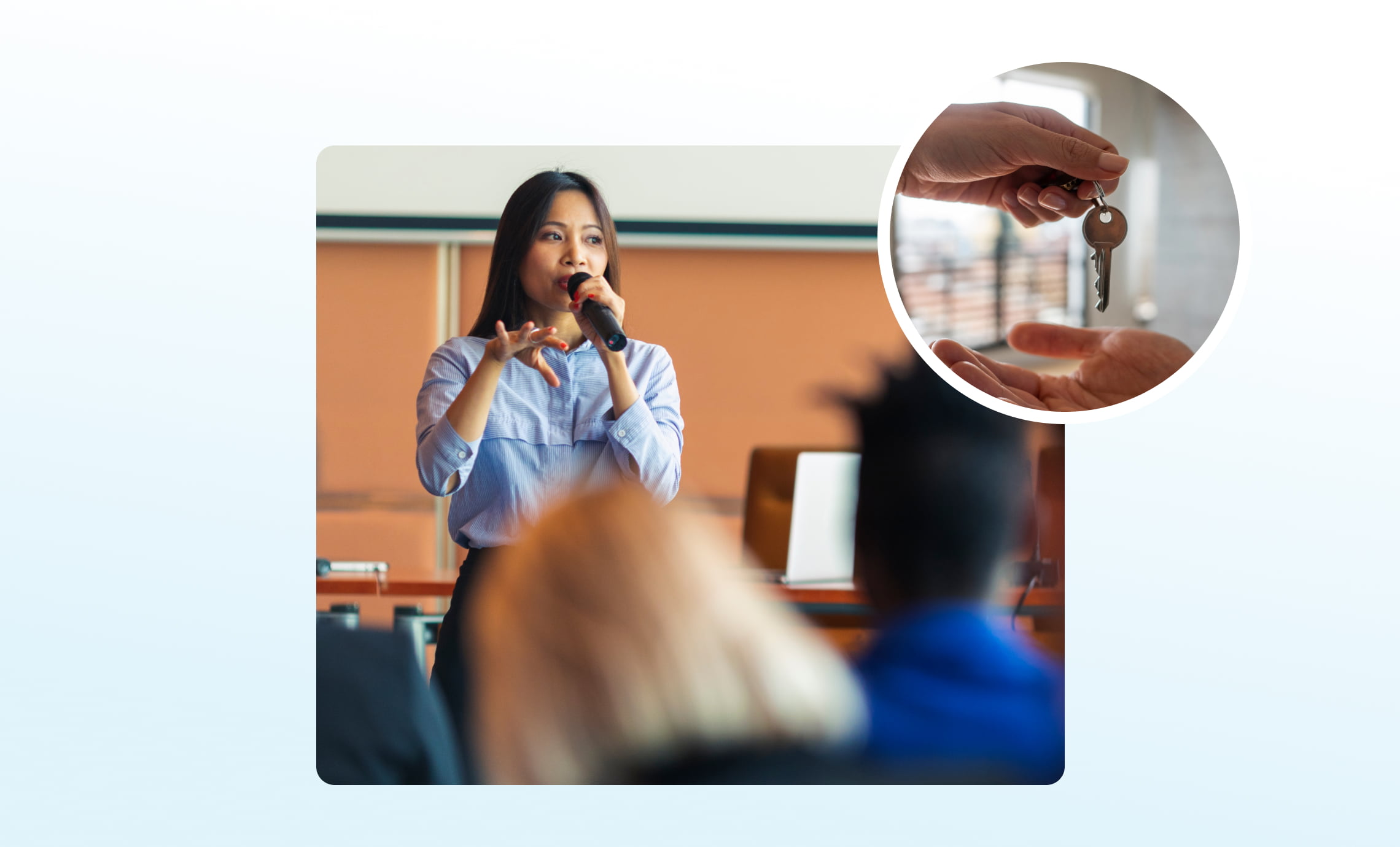Event planning is hardly a one-person job. Behind every successful event lies a team of professionals, vendors, and stakeholders working in harmony toward a shared goal. Collaboration isn’t just a buzzword—it’s a vital ingredient in crafting memorable and impactful events.
Whether you’re organizing a conference, fundraiser, or gala, fostering strong collaborative relationships can be the difference between a good event and an extraordinary one.
As Henry Ford said, “If everyone is moving forward together, then success takes care of itself.”
When collaboration connects with industry-leading event management solutions, that’s when events exceed expectations and raise the bar for other experiences.
Here, the Attendee Interactive team reviews the specific benefits of collaboration in event planning, from sparking creativity to reducing costs, and provide actionable strategies to build and maintain effective partnerships.
What is Collaboration in Event Planning?
At its core, collaboration in event planning involves bringing together diverse individuals and organizations to pool their expertise, resources, and ideas. By aligning efforts, event professionals can create seamless experiences for attendees, achieve common objectives, and overcome logistical challenges with greater ease.
In the wise words of NBA great, Michael Jordan, “Talent wins games, but teamwork and intelligence win championships.”
TECH TIP: Inspire better collaboration by incorporating conference management software into your efforts. With Attendee Interactive, event organizers can access a comprehensive approach to event planning, which includes: multiple conference/event support, function requests, space diary, staff time grid, financial management, budget and expense tracking, staff management, report builder, and vendor center. It’s a single-space solution that elevates event management.
The Benefits of Collaboration in Event Planning
Enhanced Creativity and Innovation
When multiple perspectives come together, creativity flourishes. Brainstorming with a diverse team—whether it’s event staff, sponsors, or vendors—can generate ideas that you might not have considered alone. These varied viewpoints often lead to innovative solutions, unique event themes, and memorable attendee experiences.
For example, partnering with a vendor who specializes in interactive technology could transform a standard conference booth into an immersive virtual reality experience, setting your event apart from the competition.
Cost-Effectiveness and Resource Sharing
Collaboration often allows for the sharing of resources, which can help reduce overall costs. Sponsors may offer financial support in exchange for brand visibility, while vendors might provide discounted services in return for exclusive contracts or partnerships. By leveraging these collaborative opportunities, event planners can stretch budgets further without compromising quality.
For instance, working with a venue partner might grant access to in-house AV equipment or staff at no additional charge, reducing the need for third-party hires.
Increased Networking Opportunities
Collaboration extends your professional network, opening doors to new opportunities. Working with a variety of partners not only enhances your current event but also builds relationships that could benefit future projects. Each collaborator brings their audience, connections, and expertise to the table, helping to expand your reach and impact.
A successful event collaboration often leads to word-of-mouth referrals and positive industry recognition, further strengthening your reputation as an event professional.
The Role of Teamwork in Event Success
Teamwork is the foundation of effective event planning. A well-coordinated team can navigate challenges more efficiently and execute tasks with precision. Whether it’s assigning roles, managing timelines, or addressing last-minute changes, teamwork ensures every aspect of the event runs smoothly.
Examples of Effective Team Collaboration
- Conference Management: Teams that divide responsibilities—such as speaker coordination, attendee registration, and marketing outreach—can focus on their specific roles, ensuring no detail is overlooked.
- Fundraising Events: Collaboration between fundraising committees and marketing teams can create compelling campaigns that drive both attendance and donations.
TECH TIP: Attendee Interactive features Session & Speaker Management that empowers event organizers to keep sessions organized and ensure speakers are equipped with the tools they need to leverage the best event experience possible.
Explore how our solution helps event organizers when it comes to Managing Last-Minute Changes: How Attendee Interactive Handles Session Updates in Real Time.
And don’t miss, How to Hype a Speaker: Building Excitement for a Memorable Presentation
Strategies for Building Effective Event Partnerships
Establish Clear Communication
Open and consistent communication is key to any successful collaboration. Set expectations early, outline roles and responsibilities, and keep all parties informed throughout the planning process. Using project management tools can help streamline updates and track progress.
Build Strong Relationships with Sponsors and Vendors
Fostering mutually beneficial relationships with sponsors and vendors is essential. Understand their goals and align them with your event’s objectives. Highlight the value they’ll gain from partnering with you, whether it’s increased visibility, lead generation, or direct engagement with their target audience.
“Attendee Interactive is a game changer. It’s so easy to input all the information you need to communicate to the vendor.” — Anthony Maggiore, Senior Director of Conference and Meetings, American Academy of Physician Associates
Leverage Social Media for Collaboration
Social media isn’t just for promotion—it’s also a powerful tool for collaboration. Use platforms like LinkedIn or Instagram to connect with potential partners, share updates, and showcase your event’s progress. Collaborative posts, tags, and cross-promotions can amplify your event’s reach and foster stronger relationships.
Overcome Common Challenges
Collaboration isn’t without its hurdles. Misunderstandings, mismatched expectations, or logistical hiccups can arise. Address these challenges by:
- Setting clear goals from the outset.
- Hosting regular check-ins with partners.
- Staying flexible and solution-focused when issues emerge.
Measuring and Celebrating Collaboration Success
Tools and Metrics for Evaluation
Assess the success of your collaborative efforts with data-driven insights. Track metrics such as:
- Increased attendance numbers.
- Sponsorship ROI.
- Social media engagement rates.
- Post-event surveys to gauge attendee satisfaction.
TECH TIP: By integrating Attendee Interactive, event organizers can access the Attendee Tracking feature, which makes tracking session attendance and attendee engagement throughout the event simple and straightforward.
Celebrate Achievements Together
Recognizing and celebrating the milestones achieved through collaboration reinforces strong relationships. Host a post-event wrap-up meeting or appreciation dinner to thank your partners and discuss lessons learned. Publicly acknowledge contributors in event recaps, social media posts, or press releases to highlight their impact.
Elevate Your Events Through Collaboration
Collaboration isn’t just a strategy; it’s a mindset that can transform the way events are planned and executed. By embracing partnerships, fostering teamwork, and leveraging diverse perspectives, you can create impactful, memorable experiences that resonate with attendees and stakeholders alike.
Ready to take your events to the next level? From streamlining workflows to creating personalized journeys, discover the mutual benefits of tech-driven collaboration for seamless events from setup to wrap-up in our new guide From Setup to Wrap-Up: How Integrated Event Technology Drives Efficiency and Attendee Engagement!


